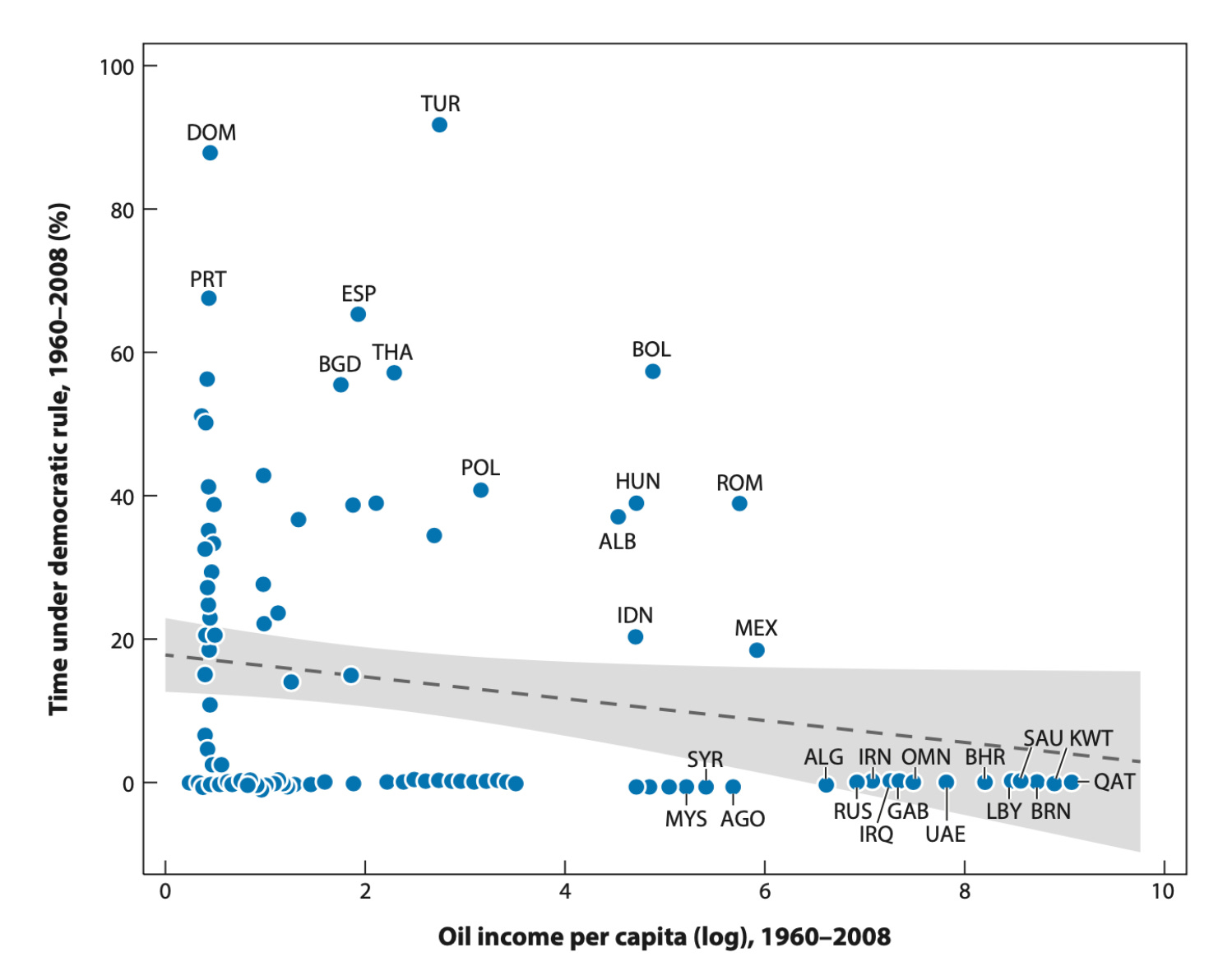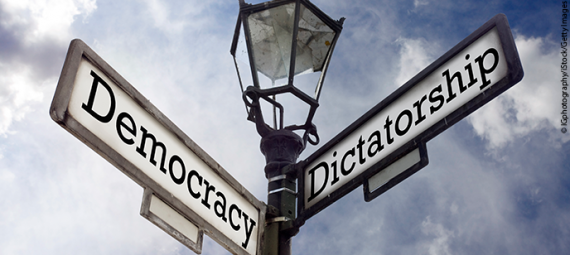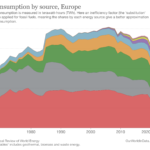by Johannes Eber – The Pixel Economist
Here is the Top-10 list of countries with the largest natural gas reserves:
1. Russia
2. Iran
3. Qatar
4. United States
5. Saudi Arabia
6. Turkmenistan
7. United Arab Emirates
8. Venezuela
9. Nigeria
10. China
And here is the list with oil reserves:
1. Venezuela
2. Saudi Arabia
3. Canada
4. Iran
5. Iraq
6. Kuwait
7. United Arab Emirates
8. Russia
9. Libya
10. Nigeria
As we can see, there are not many democracies among the most resource-rich countries. Why?
Under the name “political resource curse”, there has been a broad economic debate on this question over the past 20 years.
The claim “political resource curse” means that natural resource wealth tends to adversely affect a country’s governance.
In the following three steps, I will
- deepen the relation indicated above,
- explain the reasons for this connection,
- write about what can be done.

The figure above shows the correlation between oil wealth and democratic transitions (taken from here). All countries that could have transitioned from authoritarianism to democracy from 1960 to 2008 are listed there. The higher up the country is positioned, the longer the time the country was a democracy (vertical axis); the further to the right the country is, the greater its oil wealth (horizontal axis).
The pattern in the figure suggests that the greater a country’s oil income, the less likely it has been to transit to democracy.
“The core finding that more oil wealth is associated with less democracy has been replicated many times, using better data and increasingly sophisticated methods”, the American political scientist Michael L. Ross writes in the worth-reading paper “What Have We Learned about the Resource Curse?“.
However, the question is whether the correlation is also a causality, that is, oil wealth causes authoritarian rule.
2.
There is causality. At least when it comes to oil. Ross, who has reviewed the literature on the subject, writes: “There is now robust evidence that one type of mineral wealth, petroleum, has at least three harmful effects.” These are the effects:
- It makes authoritarian regimes more durable.
- It increases certain types of corruption.
- It helps to trigger violent conflict in low- and middle-income countries.
So it seems evident that oil wealth can lead to less democracy. The question then is why. What are the mechanisms that link more oil to less democracy?
There are basically two explanations: oil wealth makes coming and staying in power more attractive; and oil wealth makes it easier to remain in power.
In contrast to the first explanation, the latter assumes that resource wealth doesnot affect the preferences of rulers, only their fiscal capacity to act on these preferences. This latter explanation is often called the “rentier effect“. It goes like this: An abundant flow of oil revenues enables incumbents to both reduce taxes and increase patronage and public goods, making it possible for them to buy off a larger set of potential challengers and reduce dissent.
On the other hand, the “more attractive” approach suggests that resources affect the value leaders place on coming or remaining in office rather than their capabilities. Ross: “According to these models, the availability of resource rents makes incumbency more valuable, inducing a ruler to invest more in regime-preserving activities.”
3.
We have learnt that democracy often has a hard time in resource-rich countries. What can be done about it?
In recent years, the World Bank, the G20, and the United Nations Development Program have launched initiatives to stop the resource curse. And both the United States and the European Union have adopted new transparency laws that are explicitly designed to alleviate the curse in resource-exporting countries. Future empirical research will show whether the measures are having an effect.
I fear that as long as oil and gas resources bring in plenty of money, the bad incentives that lead to dictatorships will remain.
Therefore, the only sustainable way might be that renewable energies are becoming more attractive. If fossil fuels are no longer needed because renewable fuels are plentiful, the incentives and opportunities for authoritarian regimes to come to or remain in power decrease.
In a way, this is currently happening with Russia’s war of aggression in Ukraine. As ways are sought to do without Russia’s wealth of resources, the world market price for fossil fuels is rising, which automatically makes renewable energies more competitive. In such a situation, investments in the production of renewable energies increase sharply. In the long term, this reduces the price for its use. This will make renewable energies increasingly competitive, even if the price of fossil energy will fall again.
Such a policy of abandoning the resources of dictatorships is therefore doubly effective: In the short run, the authoritarian regime is deprived of income (e.g. because of sanctions) and in the long run, after attractive new sources of energy are developed, demand – and therefore prices – for fossil fuels will be low.
There is reason to hope that there will be more democracy in the future.
Author Profile

-
Founder of the "Good morning Europe blog" and Pixel economist
Guest author for European Liberals for Reform
Johannes' articles are originally written for the “Good morning Europe” blog (www.goodmorningeurope.org) and the Pixel economist (https://thepixeleconomist.substack.com).
We were given permission to publish his articles on the European Liberals for Reform blog.
Latest entries
Post Disclaimer
The opinions expressed by the author of this post do not necessarily represent the opinions and policies of ELfR.




